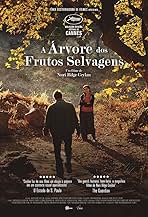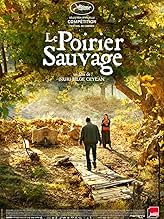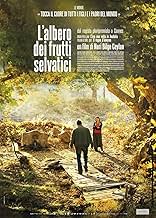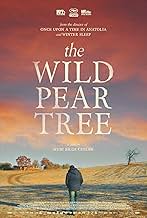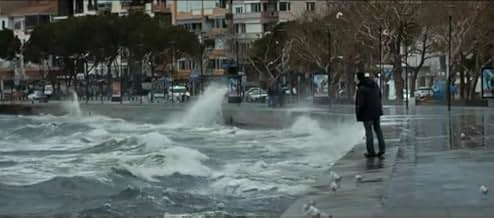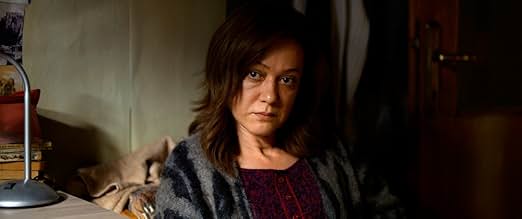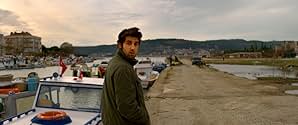PUNTUACIÓN EN IMDb
8,0/10
30 mil
TU PUNTUACIÓN
Un aspirante a escritor vuelve a su pueblo natal donde las deudas de su padre le encuentran.Un aspirante a escritor vuelve a su pueblo natal donde las deudas de su padre le encuentran.Un aspirante a escritor vuelve a su pueblo natal donde las deudas de su padre le encuentran.
- Dirección
- Guión
- Reparto principal
- Premios
- 10 premios y 15 nominaciones en total
Dogu Demirkol
- Sinan Karasu
- (as Aydin Doğu Demirkol)
Reyhan Asena Keskinci
- Yasemin Karasu
- (as Asena Keskinci)
Reseñas destacadas
The film depicted a cliche plot of life that happen everywhere in the world that nobody in hollywood would ever produce. it's a loser story, something that might not be "inspiring", "uplifting", and just plain depressing and plays at key minor at an instrument (even tho there's some note changes at the end). it's a taboo song that people often treat as a myth. it's like discovering Bicycle Thieves and Mouchette once again.
The Wild Pear Tree is Nuri Ceylan's most recent long, compelling character study of a newly graduated student struggling to publish his supposedly unique book about life living in Canakkale. The movie can be said to be the sum of Sinan's interactions with various people throughout the film, including his father who has a gambling addiction, his mother and sister who don't seem overly supportive of him, his apparent love interest, various publishers, religious imams and public figures, and of course other famous writers. The move is very dialogue driven, but it is also not at the same time, given its long runtime, there are also many scenes of simple quietness, and mere great cinematography. However, at times, it feels as though Ceylan has dragged it too far. He appears to have gotten too comfortable in the Director's seat and it feels as though some dialogue scenes and some scenes showcasing amazing cinematography are too long. The plot, or at least the main background story following the move along, also does not feel as compelling as his previous film Winter Sleep. Overall, the movie is great, but also tends to drag a bit. In his previous film Winter Sleep, I think Ceylan got the balance right for achieving the classification 'masterpiece.' However, in the Wild Pear Tree, it is merely a good movie with its flaws, and the main flaw anyone will feel coming out of the film is some of the unnecessary runtime.
The wind rises as Sinan and Hatice kiss at a spring on the outskirts of the forest. It is the threshold of many things, not merely the forest. A few steps in the right direction will lead to love and the fulfillment of dreams. The wrong steps invite heartbreak and the crushing weight of societal expectations. Which way to go?! While Sinan inspires Hatice to let her hair down, a big step in Turkey, he can't seem to help himself. The gambling addiction, fawning desire to please and wild schemes of his father are not where Sinan wants to go, yet understanding his father is the key to understanding himself, for better or worse. Wild pears are isolated misfits, and so are father and son.
This witty and beautiful film is full of metaphors, wonderful imagery and deep, intriguing conversations. The film revolves around many interesting themes. Among these themes is that ruptures in the soul should be treated with joy and patience for they help us discover who we are. The cinematography is luminous, mesmerizing and far ranging from lamp lit streets at night, rainfall and close-ups of Hatice's flowing hair. I want to linger in each place. It is a long film, but for what it reveals about contemporary Turkish society and human nature, it is a fantastic bargain and worth the price. From the director of Winter Sleep and Once Upon a Time in Anatolia. Seen at the 2018 Toronto International Film Festival.
This witty and beautiful film is full of metaphors, wonderful imagery and deep, intriguing conversations. The film revolves around many interesting themes. Among these themes is that ruptures in the soul should be treated with joy and patience for they help us discover who we are. The cinematography is luminous, mesmerizing and far ranging from lamp lit streets at night, rainfall and close-ups of Hatice's flowing hair. I want to linger in each place. It is a long film, but for what it reveals about contemporary Turkish society and human nature, it is a fantastic bargain and worth the price. From the director of Winter Sleep and Once Upon a Time in Anatolia. Seen at the 2018 Toronto International Film Festival.
I felt every minute of this very long Turkish film.
Long because it's, well, long (clocking in at just over three hours). But also long because the main character, who's in virtually every frame of the movie, is such an unpleasant person to hang out with. And part of the reason that he's so unpleasant is that he's recognizable, as I've been that person myself. He's young, fresh out of college, and thinks he knows everything there is to know about life despite having almost no experience of it himself. He's cocky, condescending, and unbearable. What ultimately makes him worth spending time with, and for that matter makes the whole movie worth sticking with, is the final scene, in which he comes to understand that the father who he's shunned because of all the life mistakes he's so determined not to make himself is perhaps the one person in his life who most understands him and most emulates the ideals the son goes around shoving down everyone's throat.
This is the kind of movie I wish I had seen with someone else so I could have someone to talk about it with. Throughout the film, the protagonist has little moments of.....I'm not sure what to call them.....daydreams? hallucinations? A scene will play out one way, and the it will abruptly shift gears and play out another, leading us to believe that the first version was in the protagonist's head. I'm not sure what to make of these breaks from reality. He's written a book that he's trying to get published, so maybe these episodes are a glimpse into how events play out in his book rather than how they did in reality? Or maybe it's the reverse. Maybe the movie we're watching is the book he wrote, and these moments are what actually happened. Or maybe it's neither and I'm overthinking. Maybe he's just a writer who is always attuned to alternative paths a person's narrative might take.
The ending didn't exactly make me feel like all of the three hours preceding it were necessarily worth it. I don't know why the movie had to be quite so long. But it did linger in my head and it's made the whole movie grow in stature for me when I think back on it. I don't know that I'd want to watch it again, but I'm glad I watched it once.
Grade: A
Long because it's, well, long (clocking in at just over three hours). But also long because the main character, who's in virtually every frame of the movie, is such an unpleasant person to hang out with. And part of the reason that he's so unpleasant is that he's recognizable, as I've been that person myself. He's young, fresh out of college, and thinks he knows everything there is to know about life despite having almost no experience of it himself. He's cocky, condescending, and unbearable. What ultimately makes him worth spending time with, and for that matter makes the whole movie worth sticking with, is the final scene, in which he comes to understand that the father who he's shunned because of all the life mistakes he's so determined not to make himself is perhaps the one person in his life who most understands him and most emulates the ideals the son goes around shoving down everyone's throat.
This is the kind of movie I wish I had seen with someone else so I could have someone to talk about it with. Throughout the film, the protagonist has little moments of.....I'm not sure what to call them.....daydreams? hallucinations? A scene will play out one way, and the it will abruptly shift gears and play out another, leading us to believe that the first version was in the protagonist's head. I'm not sure what to make of these breaks from reality. He's written a book that he's trying to get published, so maybe these episodes are a glimpse into how events play out in his book rather than how they did in reality? Or maybe it's the reverse. Maybe the movie we're watching is the book he wrote, and these moments are what actually happened. Or maybe it's neither and I'm overthinking. Maybe he's just a writer who is always attuned to alternative paths a person's narrative might take.
The ending didn't exactly make me feel like all of the three hours preceding it were necessarily worth it. I don't know why the movie had to be quite so long. But it did linger in my head and it's made the whole movie grow in stature for me when I think back on it. I don't know that I'd want to watch it again, but I'm glad I watched it once.
Grade: A
Turkish master filmmaker Nuri Bilge Ceylan's follow-up to his superb WINTER SLEEP is another intimate epic. Again, over 3 hours long, but, focused on a writer, Sinan. The writer here is a young college graduate determined to not only publish his first novel, but, also to break free from his father, Idris - a teacher who also had wild ambition, but, never succeeded.
While the story is simple, Ceylan plunges at length into his characters. A couple of sequences truly stand out: First, is an accidental meeting with a young woman the writer once had his eye one, but, who is now headed, unenthusiastically, into a marriage. The scene plays out in 'real time'. Long past the point where a conventional movie would have moved on. At first it draws the viewer in, and, later, makes one feel almost uncomfortable. As if intruding on a private moment. Even more awkward is a long sequence where Sinan meets a successful local author. They engage. Then spar. Then quarrel. All of the audaciousness and frustrations of Sinan play out over the extended scenes.
Despite the tight nature of the plot, Ceylan isn't a 'drawing room' type of filmmaker. He uses the vast Turkish landscape as a means of showing how small a man can be against such a harsh environment. As I noted: an intimate epic.
In the end, WILD PEAR TREE doesn't work as well as a WINTER SLEEP, or his masterwork, ONCE UPON A TIME IN ANATOLIA. The central character isn't quite interesting enough to carry the length of the movie. And, the relationship arc with the father is rather easy to discern long before the half-way point. PEAR isn't a movie for the casual filmgoer. But, it is one to savor should one want to plunge themselves into this world - like diving into a densely detailed novel.
¿Sabías que...?
- CuriosidadesAccording to Nuri Bilge Ceylan, The Wild Pear Tree is about a son's unavoidable slide towards a fate resembling that of his father.
- Citas
Sinan Karasu: When we learn we are not so important why is our instinct to be hurt? Wouldn't it be better to treat it as a key moment of insight? We engender our own beliefs. Thus we need to believe in separation as much as in beauty and love, and to be prepared. Because rupture and separation in wait for everything beautiful. In which case, why not treat these tribulations as constructive disasters that help us pierce our own mysteries.
- ConexionesFeatures Umutsuzlar (1971)
- Banda sonoraPassacaglia and Fugue in C minor, BWV 582
Composed by Johann Sebastian Bach
Performed by Leopold Stokowski
Selecciones populares
Inicia sesión para calificar y añadir a tu lista para recibir recomendaciones personalizadas
- How long is The Wild Pear Tree?Con tecnología de Alexa
Detalles
- Fecha de lanzamiento
- Países de origen
- Sitios oficiales
- Idioma
- Títulos en diferentes países
- The Wild Pear Tree
- Localizaciones del rodaje
- Yenice, Çanakkale, Turquía(location)
- Empresas productoras
- Ver más compañías en los créditos en IMDbPro
Taquilla
- Recaudación en Estados Unidos y Canadá
- 34.014 US$
- Fin de semana de estreno en EE. UU. y Canadá
- 4923 US$
- 3 feb 2019
- Recaudación en todo el mundo
- 1.696.258 US$
- Duración3 horas 8 minutos
- Color
- Mezcla de sonido
- Relación de aspecto
- 2.39 : 1
Contribuir a esta página
Sugerir un cambio o añadir el contenido que falta

Principal laguna de datos
By what name was El peral salvaje (2018) officially released in India in English?
Responde

